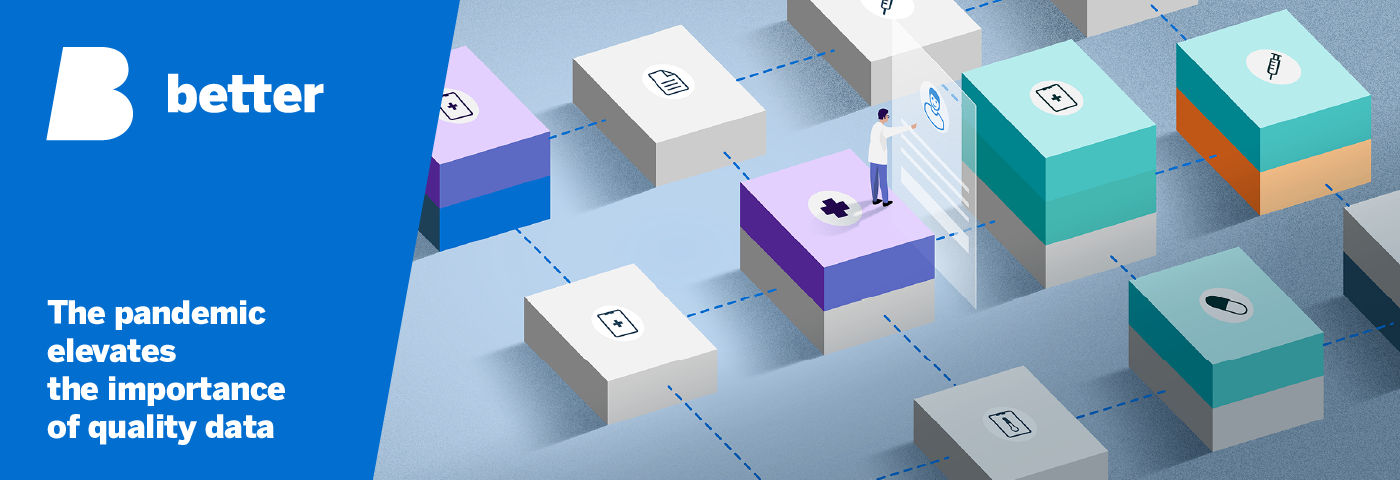The pandemic elevates the importance of quality data
On 8 July, our CEO, Tomaž Gornik, made a presentation at the ECH Alliance Webinar: Pop-Up Ecosystem “Matching supply & demand in COVID times”. His presentation was titled “The pandemic elevates the importance of quality data”, and here we would like to share a brief summary.
A crisis like the COVID-19 pandemic creates a lot of issues, such as the difficulty of obtaining and putting the right data together into shared care records which could be used across regions or countries to address the challenges of the pandemic. However, this problem has been known for a while now. In healthcare, we need to keep health data for very long time – ideally for the lifetime of the patient.
Tomaž Gornik highlighted the fact that data is a key ingredient for making decisions in healthcare. The NHS in the UK, as well as Gartner and EY, emphasised the need for a new approach in health IT which would be based on open standards (avoiding or completely preventing vendor lock-in), a “modular” versus “monolith” architecture, and the increasing importance of health data. He discussed these topics in his latest blog as well.
In support of this, Tomaž Gornik shared a few case studies in which healthcare organisations are already benefiting from an open-data approach, especially during the COVID-19 pandemic.
The city of Moscow healthcare system was completely paper-based prior to their digital transformation project. The scope of the system is huge: it has 320+ medical, legal entities of which there are 105+ hospitals with 408 units and 170+ outpatient clinics with 665 units, and more than 55,000 doctors take care of 12,6+ million citizens. In five years, they managed to transform their entire healthcare system into one that uses an electronic record management system to manage the data of all Moscow citizens in a single data centre. Though the data is centralised, applications are provided by several different vendors, but they all must store all data in an agreed upon and open format.
When COVID-19 struck, it was much easier for them to provide the necessary support to care teams, because they already had a consistent patient care record with fully validated data, which they could use to drive clinical decisions.
HiGHmed consortium in Germany is comprised of eight major university hospitals, including the prominent Charité in Berlin and Heidelberg. Their main issue was sharing data among hospitals for research purposes. They established an innovative information infrastructure based on an open platform to increase the efficiency of clinical research and to swiftly translate research results into validated improvements of patient care. All eight hospitals can now use and share this data.
When the COVID-19 pandemic hit they already had their infrastructure in place. One of the solutions built upon Better Platform is the Smart Infection Control System (SmICS), which was developed during the pandemic. The SmICS can show contacts between patients, basic epidemiological statistics, and patient timelines. The main goal of SmICS is to provide relevant, precise, and structured data for the German healthcare system in order to improve COVID-19 patient care. Better Platform is used for data which is contributed to the German National Research Network for COVID-19 as well. You can read more about the project here.
The third example presented was Somerset NHS Foundation Trust. In discussing this case, Tomaž Gornik emphasised the benefits of having an international openEHR community – very early on clinicians from around the world (China, Italy, Germany, Norway, UK) started to develop high-quality clinical data models, which were then used by Somerset NHS Foundation Trust. Using a platform approach with a low-code form builder, they created, customised, deployed, and improved the digital forms that integrate into its wider IT infrastructure in less than three weeks. You can access the article and the video of the project here.
Tomaž Gornik concluded the presentation with these key take-aways:
- the COVID-19 pandemic has increased the need for interoperable, quality data;
- the lifecycle of data and applications is different, so we need to separate the two;
- NHSX in the UK, Gartner Group, and EY are publishing papers which express the need for a modular, open-platform, data-centric approach;
- openEHR clinical models improve data quality, while openEHR platform specifications enable vendor-neutral, life-long health records.
You can watch the webinar here.
